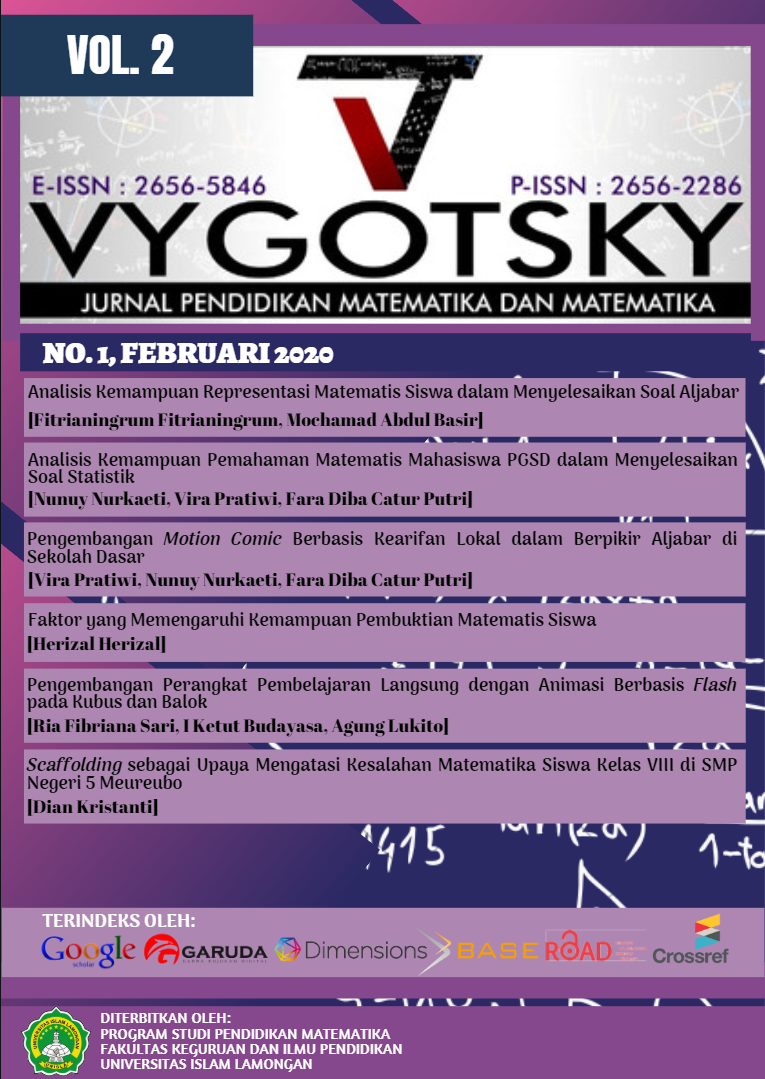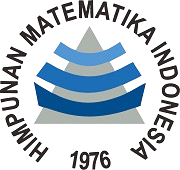Faktor yang Memengaruhi Kemampuan Pembuktian Matematis Siswa
DOI:
https://doi.org/10.30736/vj.v2i1.187Keywords:
Bukti Matematis, Kemampuan Pembuktian MatematisAbstract
Kemampuan pembuktian matematis merupakan kemampuan penting dalam pembelajaran matematika. Namun, kemampuan tersebut menjadi salah satu kemampuan yang sulit dikuasai siswa. Untuk mengatasi hal itu, perlu dikaji faktor-faktor yang memengaruhi kemampuan tersebut. Oleh karena itu, penelitian ini dilakukan untuk melihat faktor-faktor yang memengaruhi kemampuan pembuktian matematis. Kuesioner diberikan kepada 30 siswa kelas X salah satu SMA Swasta di Kota Bandung yang baru selesai belajar proses pembuktian matematis. Masing-masing butir pernyataan diberikan skor dan diurutkan dari skor tertinggi ke rendah, selanjutnya beberapa butir pernyataan tersebut dikelompokkan ke dalam faktor baru berdasarkan urutan skor. Hasil menunjukkan faktor pengalaman menjadi faktor terkuat bagi siswa dalam memengaruhi kemampuan pembuktian matematis. Faktor berikutnya adalah faktor kemampuan, faktor waktu, faktor sikap dan motivasi, serta faktor guru.Downloads
References
Abdullah, A. H., Abidin, N. L. Z., & Ali, M. (2015). Analysis of students errors in solving Higher Order Thinking Skills (HOTS) problems for the topic of fraction. Asian Social Science, 11(21), 133–142. https://doi.org/10.5539/ass.v11n21p133
Ahmadi, A., & Supriyono, W. (2013). Psikologi Belajar. Jakarta: Rineka Cipta.
Brodie, K. (2010). Teaching Mathematical Reasoning in Secondary School Classrooms. New York: Springer. https://doi.org/10.1007/978-0-387-09742-8
Broussard, S. C., & Garrison, M. E. B. (2004). The relationship between classroom motivation and academic achievement in elementary-school-aged children. Family and Consumer Sciences Research Journal, 33(2), 106–120.
Dimyati, & Mudjono. (2015). Belajar dan Pembelajaran. Jakarta: Rineka Cipta.
Doruk, M., & Kaplan, A. (2015). Prospective mathematics teachers’ difficulties in doing proofs and causes of their struggle with proofs. 1st International Eurasian Educational Research Congress, 315–328.
Hamid, H. (2016). Kemampuan Pembuktian, Berpikir Kritis, dan Self-Efficacy Matematis Mahasiswa Melalui Model Rigorous Teaching and Learning (TL) dengan Memanfaatkan Argumen Informal. Sekolah Pascasarjana Universitas Pendidikan Indonesia. Bandung. Disertasi Doktor pada SPs UPI Bandung. (Tidak Diterbitkan).
Hendriana, H., Rohaeti, E. E., & Sumarmo, U. (2017). Hard Skill dan Soft Skill Matematik Siswa. Bandung: Refika Aditama.
Hersh, R. (1993). Proving is convincing and expalining. Educational Studies in Mathematics, 24, 389–399.
Kaeley, G. S. (1993). Explaining mathematics achievement of mature internal and external students at the University of Papua New Guinea. Educational Studies in Mathematics, 25(3), 251–260.
Khodijah, N. (2014). Psikologi Pendidikan. Jakarta: RajaGrafindo Persada.
Kilpatrick. (2001). Adding it up: Helping Children Learn Mathematics. Washington, DC: National Reserach Council.
Köǧce, D., & Yildiz, C. (2011). A comparision of freshman and senior mathematics student teachers’ views of proof concept. Procedia - Social and Behavioral Sciences, 15, 1266–1270. https://doi.org/10.1016/j.sbspro.2011.03.274
Mellyzar. (2020). Penerapan strategi pembelajaran berbasis masalah dan inkuiri untuk meningkatkan hasil belajar siswa pada materi larutan penyangga. Genta Mulia, XI(1), 33–35.
Muliaman, A., Suyanti, R. D., & Eddiyanto. (2018). Relationship between Motivation and College Students Learning Outcomes on Chemical Kinetic Material at University. Advances in Social Science, Education and Humanities Research, 200, 26–28.
NCTM. (2000). Principles and standards for school mathematics. Reston, VA.
Samparadja, H. (2014). Pengaruh Pendekatan Induktif-Deduktif Berbasis Definisi Termodifikasi dalam Pembelajaran Struktur Aljabar Terhadap Peningkatan Kemampuan Pembuktian da Disposisi Berpikir Kreatif Matematis Mahasiswa. Sekolah Pascasarjana Universitas Pendidikan Indonesia. Bandung. Disertasi Doktor pada SPs UPI Bandung. (Tidak Diterbitkan).
Schiefele, U., & Csikszentmihalyi, M. (1995). Motivation and ability as factors in mathematics experience and achievement. Journal of Research in Mathematics Education, 26(2), 163–181.
Sugiyarto, K. H., Ikhsan, J., & Lukman, I. R. (2018). The use of an android – based-game in the team assisted individualization to improve students ’ creativity and cognitive achievement in chemistry. Journal of Physics: Conference Series, 1022(12037), 1–7. https://doi.org/10.1088/1742-6596/1022/1/012037
Suryawati, Budiman, & Herizal. (2014). Analisis Kemampuan Problem Solving Siswa Kelas XI SMA Negeri Modal Bangsa Tahun Ajaran 2013/2014 dalam Menyelesaikan Masalah Aljabar. In M. Hidayat & M. Nazar (Eds.), Prosiding Seminar Nasional dalam Rangka Konsorsium Perguruan Tinggi Indonesia-Pittsburgh (pp. 125–136). Banda Aceh: FKIP Unsyiah.
Syah, M. (2015). Psikologi Belajar. Jakarta: RajaGrafindo Persada.
Downloads
Published
How to Cite
Issue
Section
License
Copyright:
Authors who publish their manuscripts in this Journal agree to the following conditions:
- Copyright of any article on Vygotsky: Jurnal Pendidikan Matematika dan Matematika is held solely by the author under the Creative Commons Attribution 4.0 International license (CC BY NC SA).
- Authors can submit papers separately, arrange non-exclusive distribution of manuscripts that have been published in this journal into other versions (e.g. sending to the author's institutional repository, publication in a book, etc.) by acknowledging that the manuscript has been published for the first time in Vygotsky: Jurnal Pendidikan Matematika dan Matematika.
License:
Vygotsky: Jurnal Pendidikan Matematika dan Matematika is published under the terms of the Creative Commons Attribution 4.0 International License (CC BY NC SA). This license permits anyone to copy and redistribute this material in any form or format, compile, modify and develop this material for any purpose as long as it is not for commercial purposes. Additionally, anyone must provide credit and distribute contributions under the license of the creator of the original work.







